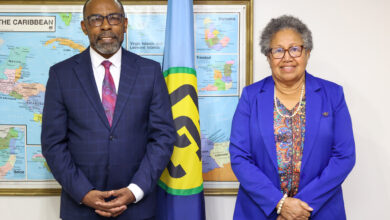Mr. Master of Ceremonies,
The Honourable Mr. Stephenson King, Prime Minister of Saint Lucia and Head of Government with Lead responsibility for Sustainable Development in CARICOM
The Honourable Robert Persaud, Minister of Agriculture, Guyana, Representing H.E. Bharrat Jagdeo, President of Guyana and Chairman of CARICOM
Honourable Ministers
Assistant Secretaries General Granderson and Greene
Officials from CARICOM Member States
Distinguished Representatives of Regional Institutions
National Government Officials
Other Distinguished Participants
Representatives of the Media
Staff
Good morning.
It is with great pleasure that as Secretary-General of the Caribbean Community, I make the following Opening Remarks in this vital Ministerial Meeting. In doing so let me first of all express our appreciation to Honourable Prime Minister and Government of Saint Lucia for having agreed to host this critical meeting – one which could well determine the future of our Community. Let me also at the outset extend profound thanks to our Officials for their tireless effort in many fora in preparing our Community for the vital role it will need to play in these upcoming deliberations.
This meeting follows that which took place among CARICOM Heads of Government at the Conference in Georgetown, Guyana in July 2009 at which the LILIENDAAL DECLARATION ON CLIMATE CHANGE AND DEVELOPMENT was adopted.
It is most timely, as the Region prepares to participate in critical discussions on this issue with the rest of the International Community in a number of fora. These include the United Nations Secretary-General’s Conference on Climate Change in New York next week and the United Nations Climate Change Conference scheduled for Copenhagen, Denmark in December 2009.
The central objective of these exchanges is to address, perhaps the most critical challenge currently facing humanity, and indeed the planet as a whole – the phenomenon of Climate Change. It is therefore most important that at the upcoming December UN Conference in Copenhagen, the Parties fashion an agreement on the control of greenhouse gases, for this may well be the last chance for many countries and territories to make the case for effective action for their survival. As our Heads emphasised at their last Meeting, this is so, for a number of our own countries.
This situation is rendered especially urgent in the face of information that sea temperatures and levels are already rising. Recent estimates indicate that sea-level rise would be at about one meter for this century. Such sea-level rise will therefore irreversibly change the geography and ecology of many coastal states in particular.
In a publication of May 2009 titled “Low Carbon, High Growth – Latin American Responses to Climate Change” the World Bank pointed out that on the basis of recent information among the 25 most vulnerable countries in the Americas facing sea-level rise, six (6) are CARICOM Member States. These are the Bahamas, Belize, Guyana, Haiti, Jamaica and Suriname. If this information is correct this would confirm the seriousness of this matter for us in the Caribbean.
Generally, rising sea levels and changing weather patterns can have particularly disastrous consequences for countries whose infrastructure, settlement patterns and economic well-being are concentrated in coastal areas as is the case in many of our countries.
Further, in such a scenario, small developing states (as is many of our countries) tend to be more economically vulnerable than larger states. All existing meteorological models predict that our Caribbean Region will experience significant negative impact from Climate Change. It is therefore crucial that we include a development component in our Climate Change Policy.
Many scientific findings indicate that the Climate Change phenomenon is now virtually irreversible. Stabilising greenhouse gases and slowing global warming is now a matter of development and security in a globalising and increasingly unequal world. Climate Change magnifies the growing concerns regarding food security, water scarcity, energy security and the resource requirements for protection from natural disaster. Faced with these new development challenges, and to explore whatever opportunities arise from Climate Change, our Region needs to devote more time and resources to ensure that the appropriate institutional arrangements and infrastructure are in place, to provide the sound scientific information required to inform decision-making at every level: hence the great value of institutions like the Caribbean Community Climate Change Centre, among others.
The Caribbean Community shares and most strongly advance the view the view that in this current situation the global architecture on Climate Change needs to be redesigned to facilitate and promote the development of developing countries. As a Region of small developing countries, regional policy makers have generally acknowledged the significant role of multilateralism. On that basis the Region is prepared to work for and is optimistic that, at the United Nations Copenhagen Conference the appropriate action would be taken to establish a new framework for global cooperation on Climate Change. Such framework must address the basic requirements for the survival of the small islands and low-lying coastal developing states (SIDS).
At the minimum such framework to meet the needs of SIDS must encompass the following five essentials requirements, namely:
1. clarity on ambitious targets for the developed countries, including setting a long-term global goal for significant emission reductions by these countries;
2. clarity on the adaptation measures and resources required to facilitate and enhance the sustainable development plans and programmes in developing countries and thereby significantly reduce the level of poverty in developing countries;
3. clarity on measures and mechanisms to address the development challenges associated with climate change, sea level rise and disaster management for small islands and low-lying coastal developing states;
4. clarity on how the financial and technological support both for mitigation and adaptation will be generated and disbursed to developing countries. In this context, significant attention must be given by the international donor community to the special circumstances of the future vulnerability of SIDS as a result of climate change. The existing universal practice of using gross domestic product (GDP) per capita explicitly as the basis for access to resources, simply does not address the problems associated with climate change in the Caribbean; and finally
5. clarity on the institutional framework required to deliver finance and support for mitigation, adaptation, technology development and transfer and the capacity needs of developing countries.
Honourable Ministers, it is evident that the resolution of these issues necessary as they are to ensure our agreement at the UN Copenhagen Conference requires intervention at the highest political level. It is also critical that all efforts must be made to undertake the technical work necessary to underpin and advance the positions which our Member States would be seeking to advance at Copenhagen, hence the value of the outstanding work being undertaken by our officials at all Levels.
Further consultations among likeminded and similarly circumstanced countries can provide a vital input into the preparatory process of member countries. To that end the countries of Central America have sought to enter into such consultations with our CARICOM States. I gather that others are likewise interested.
In this regard, the Region’s policy makers must maintain and continue using their contacts with World Leaders and other policy makers to advance the Region’s Climate Change agenda and to ensure agreement is reached on the core issues of importance to us.
Finally to achieve the greatest solidarity among our Member States in this pursuit, every effort must be made to ensure that our policy position embodies the concerns of all Member States including those with special interests such as the REDD.
This Meeting provides us as a Community with a vital opportunity to strategise on and articulate our policy position in time for discussion at the limited number of negotiating opportunities that remain before the UN Copenhagen Conference. To this end the Region’s policymakers must therefore be vigilant and remain steadfast in their position for a new global Climate Change Agreement.
Honourable Ministers, before closing I crave your indulgence to make two announcements:
1. Dr. Ken Leslie, Director of the 5Cs is absent from this Meeting due only to the fact that at an Official Ceremony today he will be awarded the highest honour, the Order of Distinction (OD), by the Government of Belize for his contribution to Climate Change and Development. I ask you to join me in offering our warmest congratulations to Dr. Leslie.
2. We received the news yesterday that for the first time a citizen of the Caribbean, Dr. Davidson Hepburn of the Bahamas, was appointed President of the 35th General Conference of UNESCO, which is highlighting Climate Change issues among others. We must all congratulate him and wish him well in this highly sensitive task at this historic time.
Finally, I wish to thank the Government of Spain, particularly the Ambassador of Spain to Jamaica, (and the Community) His Excellency, Ambassador Jesùs Silva for the kind assistance and contribution of the resources to host this important Meeting from the 2008 Spanish Government Subvention to the Region. Today, thanks to their generosity we have a full program.
I can find no better words to conclude these remarks than the following by none other than the Hon Stephenson King, our Lead Head of Government on Sustainable Development: “Climate change will affect every aspect of human existence …. however … it is better to light a candle than curse the darkness, we should not sit and wait for the rising sea to engulf us … we should work actively to explore ways that we can respond to climate change while pursuing a broader development agenda”
Thanks to you all for your attention.




